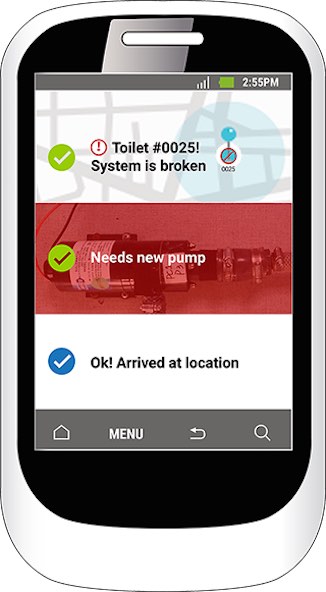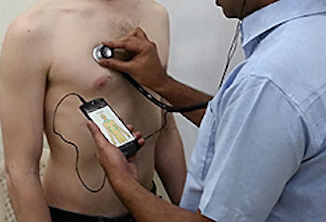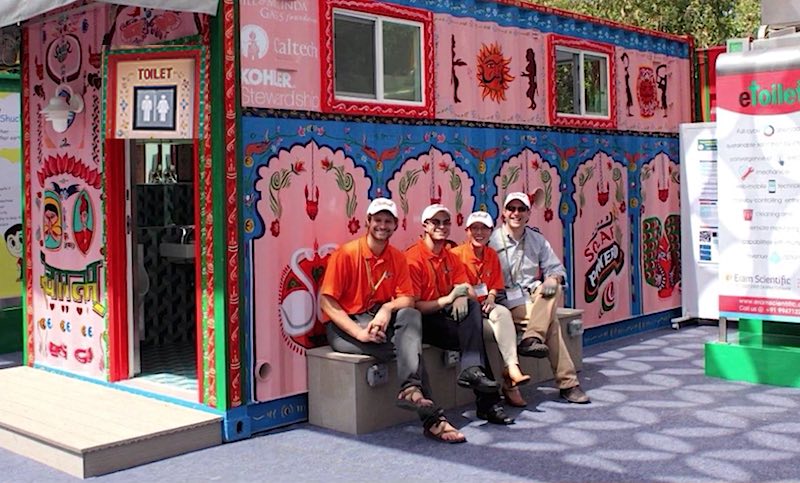Whether it’s fixing broken sanitation systems and rural wells, or diagnosing heart conditions, the winners of the 2015 Wireless Innovation Project are using mobile phone technology in extraordinary ways to help address the critical challenges facing developing countries.
Vodafone Foundation Americas yesterday presented $600,000 to the competition’s three winning tech teams to help them tackle the issues of sanitation, health, and access to clean water.
 The Caltech Sanitation Project took home first prize and $300,000, for their efforts to develop a mobile-based, self-diagnosing tool for local communities to operate an efficient wastewater management system. In particular, it helps them to fix the machines locally whenever they break down.
The Caltech Sanitation Project took home first prize and $300,000, for their efforts to develop a mobile-based, self-diagnosing tool for local communities to operate an efficient wastewater management system. In particular, it helps them to fix the machines locally whenever they break down.
From the California Institute of Technology in Pasadena, Professor Michael Hoffmann led the team consisting of Ph.D. candidates, Clement Cid and Cody Finke. “We noticed that technology currently being tested in India and other non-sewered sanitation technologies had been breaking. However, there is not enough skilled labor in developing countries to fix these technologies,” said Cid. “We realized that implementing new sanitation technologies at a global scale would be impossible with the current lack of system for maintenance.”
Their plan is to use the prize money to build and test prototypes in the field, first on the solar toilet installed on Caltech campus, and then in the prototypes installed in India and China. The project previously won the Gates Foundation’s Reinvent The Toilet Challenge in 2012 and continues to receive support from that Foundation for the development of their wastewater treatment system.
Second place and $200,000 went to a group hoping to create and implement a more sustainable clean-water management system for a number of communities. A recent study by the Rural Water Supply Network found that thirty-seven percent of sub-saharan African wells had failed in 2007, accounting for between $1.2 and $1.6 billion of wasted investment,
The prize money will be used to help the team scale up their engineering capacity and provide more communities with a well-tested product that can last for at least a decade. Ideally, they’ll be able to turn their venture in a full-time sustainable business.
 Last but not least, Mobile Stethoscope Diagnostics took home $100,000 and a third place title. The organization, known as D-lab, is the only research lab at MIT that is exclusively dedicated to frugal design and technology development for international development. “There are only about a dozen pulmonary testing labs available for the entire one billion people living in India, not to mention a severe shortage of trained pulmonologists, so people are always looking for better tools,” said Rich Fletcher, the Research Scientist at MIT who developed the project along with fellow RA Daniel Chamberlain.
Last but not least, Mobile Stethoscope Diagnostics took home $100,000 and a third place title. The organization, known as D-lab, is the only research lab at MIT that is exclusively dedicated to frugal design and technology development for international development. “There are only about a dozen pulmonary testing labs available for the entire one billion people living in India, not to mention a severe shortage of trained pulmonologists, so people are always looking for better tools,” said Rich Fletcher, the Research Scientist at MIT who developed the project along with fellow RA Daniel Chamberlain.
The prize money will be used to fund a clinical study in India, which will be the world’s first comprehensive study of a mobile platform for diagnosing pulmonary disease.
HEAR from the teams in the video below… Photo credit: Seva Sustainable Sanitation, Calif Institute of Technology




















